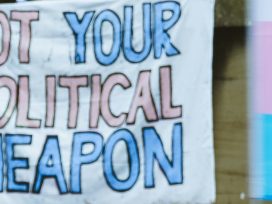In the wake of the “mid-term” elections, nobody likes President Obama. Republicans already regard him as a lame-duck President barely to be tolerated until the country turns even more to the Right. Obama’s own party tugs at him from two directions: the conservative wing urges him to be nicer to Big Business, while the Left insists that he return to liberal principles and put more government money into job creation. The electorate complains that he hasn’t done enough about the Recession, though it isn’t clear what they expect him to do.
He isn’t doing much better abroad. In recent G20 meetings, Europe stonewalled Obama’s ideas, rejecting stimulus spending in favour of austerity even as it tries to bail out Ireland and Portugal. Korea rejected the President’s overtures for a new trade treaty. China showed absolutely no interest in regulating its currency.
No wonder that every photo shows the President tight-lipped and unsmiling.
In an atmosphere like this, it’s almost irresistible to look for the positive aspects of Obama’s thinking. Despite all the pressures that he’s under, he hasn’t joined the line of America’s Great Simplifiers and reduced his “message” to a few sound bites. All the legislation he’s gotten through Congress shows his respect for complexity, and his awareness of how hard it is to balance legitimate – but conflicting– interests. His two major accomplishments – the health care and financial regulatory bills – read more like instruction manuals than directives, which is probably as it should be, given how entrenched these industries are, and what fine-tuning is required to rein them in without sending shock-waves through the rest of the economic system. The very fact that in two years he’s gotten major pieces of legislation through a contentious Congress makes him the most productive President since Ronald Reagan.
Yet it’s also easy to understand the concern on the part of the Democratic machine. They’re worried about the shift to the Right. They urge Obama to be more inspiring, and to recapture the fervour of his electoral campaign. The only problem is that they may be asking of the President something that he isn’t capable of giving.
Nothing in Obama’s history distinguishes him as a visionary. His academic training at Columbia and Harvard prepared him to make policy rather than redesign the system – to think in terms of incremental adjustments rather than sweeping changes. He’s about as far from a demagogue as any President has been in recent history, even though some in his party would probably be happier with a demagogue than a “policy wonk” – someone who likes intricate legal structures more than easy summaries.
Actually, the election wasn’t as much of a disaster as Democrats and the press made it out to be. California and New York, the two states with the largest electorates, weathered the tide of Tea Party populism. California surprised everyone by electing (and re-electing) experienced politicians over wealthy businesswomen. In Delaware, the most comical of Tea party figures – a Congressional candidate who’d flirted with witchcraft as a teenager – was soundly defeated by her rival. And Alaska re-elected an incumbent Senator by write-in vote after her party dumped her for a Tea Party newcomer. If the nation moved to the Right, it was a timid drift, caused more by impatience and hopelessness than ideology.
The fact is that neither Right nor Left knows how to reconcile American-style capitalism with social services, and so the election reflected the alternatives that the country faces – try to adjust the system so that it works a little more equitably and efficiently, or complain, and complain loudly.
One of the byproducts of the mid-term elections was that money from the financial sector, which used to be a great supporter of the President, virtually dried up. Angry about the regulations about to go into effect, the industry turned its back on the Democratic party, and worked even harder than usual to find new and more “creative” ways to speculate.
A November 19 article in the New York Times (“Investors Put Money on Lawsuits to Get Payouts”) described a particularly ingenious angle.
According to the article, it has become so expensive to sue large corporations for damages caused by pollution, inadequate safety measures, oil spills and the like, that banks have started to lend law firms money to conduct their law suits, in turn charging them high interest rates or expecting huge cuts of the eventual settlements. This practice has become a billion dollar industry: in New York State alone, more than 250 law firms are in debt to investment banking firms.
The new relationship between the financial sector and law firms has caused more than a few problems. Plaintiffs often aren’t informed of the loans, and they end up paying the interest out of their own pockets. The number of lawsuits has increased dramatically. Law firms have gone out of business trying to repay the loans. In some cases, the paybacks cost more than the settlements themselves. As the Times reporter put it, “the work sits somewhere between banking and gambling.”
As the dust settles after the mid-term elections, a few Big Questions emerge: Will the President recapture his previous popularity? Now that the Republicans control the House of Representatives, will they be a little more cooperative with the President? Will the bills that Obama squeezed through Congress be whittled down or repealed?
The answers won’t be pretty. Nothing suggests that the Republicans will relinquish their winning strategy of saying “no” to everything. The economy will continue to split in two – more money at the top, a shrinking job market in the middle and at the bottom. The President will put on a good show of trying to negotiate with his opponents at home and abroad, but he isn’t likely to get much done.
The biggest question is whether all the resistance Obama will encounter will open untapped reserves of passion in him – passion that his admirers are convinced is lying under the surface – or leave him bitter and isolated. His party is correct that he needs to reconnect with the “people”, but whether he can remains to be seen.
And, with her own TV “reality” show and best-selling books, Sarah Palin is waiting in the wings.






